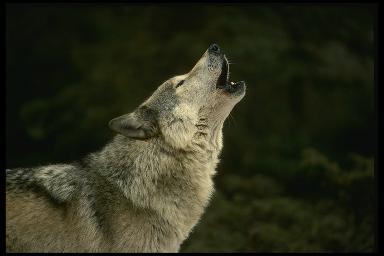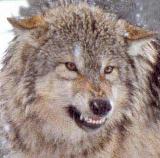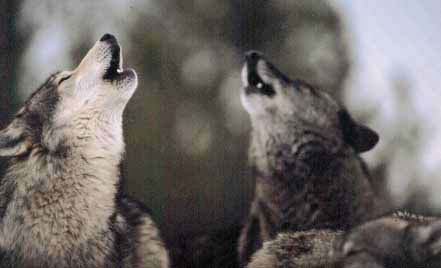Communication
Wolves don't speak English, but they still have many ways to talk to
each other. Being able to communicate effectively is
important to
maintain order in the pack and keep fights from breaking out between
members. It is also a big part of carrying out a successful
hunt.
Follow the links below to learn more about the different ways
wolves talk to each other.
Howls, Barks and Growls
Body Language
Marking Territory
Howls,
Barks and Growls

Wolves howl
to one another to
talk over long distances. They can recognize each other's
voices,
just like you recognize the voices of people you know when they call
you on the phone. Howling also declares a pack's territory to
other wolves. When a wolf wants to show submission to its
leader,
it whimpers.
Also, wolves will bark
when they are excited or squeak
to greet one another. Growling
is a way to warn or threaten others wolves.
Body Language
Wolves have many ways of talking without making any sounds.
This
is like the way someone understands what you mean when you shrug your
shoulders in confusion or cross your arms in annoyance.
The alpha wolves show dominance
by standing with their heads, ears and tails held up straight.
Other wolves in the pack show their loyalty and submission
by crouching with their heads down, ears back and tails between their
legs, or by rolling over onto their backs. They also greet one another
with wagging tails while licking each other's faces. They
greet their leader by nuzzling his face.

Wolves show aggression when
they don't like another wolf, or when they want to express their
dominance over others. They do this by raising the hair on
their
backs and baring their teeth. They can also be playful by raising
their backsides into the air and wagging their tails, just like your
dog might when it wants to play.
Marking
Territory
Packs live and hunt in a certain area, or territory.
It is important that other wolves know which territory
belongs to
which pack, since wolves might attack a wolf from a different pack if
it comes into their territory. Wolves urinate (or
"go to the bathroom") around the borders of their territory to let
others know it belongs to them. Likewise, they can smell if
another pack has marked a certain territory as its own and avoid it.



